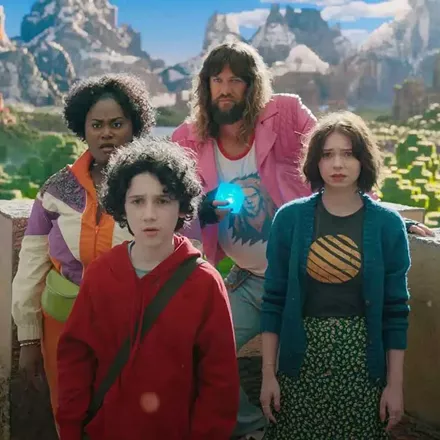
- Apple TV
For six years, Joe and Anthony Russo were immersed in the Marvel Cinematic Universe, directing Captain America: The Winter Soldier, Captain America: Civil War, Avengers: Infinity War and Avengers: Endgame. As wildly successful as those movies were—collectively grossing more than six-and-a-half billion dollars worldwide—they're not exactly the kind of movies that get people to take you seriously as filmmakers. So after a 20-year career spent almost exclusively on superheroes, episodic television and high-concept comedies, you could understand how the Russos might want to do something Serious. Something about Issues. Something that makes people think, "Hey, these guys are more than caretakers of intellectual property; they're directors."
It's awfully hard to watch Cherry—the Russos' adaptation of Nico Walker's 2018 novel—without feeling like you're getting sprayed by the sweat coming off of these guys as they direct themselves into a frenzy. Here is a two-and-a-half hour epic of war and love and addiction in which by God and sonny Jesus these guys are going to direct so that you know you've seen some directing.
From a prologue that shows our unnamed protagonist (Tom Holland) as a bank-robbing junkie circa 2007, the narrative circles back to show us how he got there. We see him as a college student from Cleveland, meeting the love of his life, Emily (Ciara Bravo); we see her dump him, inspiring his impulsive decision to sign up for the Army; we see them get back together, and make yet another impulsive decision to get married before he leaves for basic training. And, of course, we then see his experience as a medic in Iraq, leading to post-traumatic stress that ultimately leads him into opioid addition.
That's a shit-ton of narrative to pack into one movie, and Cherry does so with clearly delineated chapters for each phase of "Cherry's" experience. It leaves plenty of time for the ugly details of being in combat, like trying to stuff a soldier's intestines back into his body, or finding the corpse of a buddy burnt to a crisp. And it leaves plenty of time for the ugly details of living as an addict, making terrible choices and living on the verge of death.
In theory, there's certainly nothing wrong with a movie covering either of these subjects in an unvarnished manner, nor even with covering both of those subjects in that manner. The problems come when you get a whiff of the way the Russos quickly show themselves interested in giving all of that to you with style. When Cherry takes Ecstasy, the experience gets its own special filter to show you his point of view; ditto for when the characters dip their toes into OxyContin. Maybe one scene will abruptly become a frozen tableau; maybe another scene will trot out the old "sustained single take" to give you that real taste of the battlefield. Any individual one of these things can work, but the accumulation of them is positively exhausting. By the time one point-of-view shot literally takes us up Holland's ass, it becomes hard to tune into anything resonant this story might be saying about the struggles of being a veteran, or trying to kick drugs.
Just as frustrating is the sense that Cherry is meant to be not just a gritty commentary on American Middle East veterans trying to return to stateside life, but a satirical commentary on ... I don't know, everything. As useful as it might be to leaven such a heavy tale with a little comic relief, the alarm bells go off when the places Cherry robs to fund his and Emily's drug habit are cleverly named ShittyBank, and CapitalistOne, and Bank Fucks America. There's not a solitary thing about Cherry that benefits from subtlety and restraint, including Holland's performance, which feels exactly like something pitched between broad satire and serious drama. I don't begrudge the Russos for wanting to steer their filmmaking careers in a new direction; Cherry simply suggests that they were trying to go in all the directions—and do all the kinds of direction—at once.
